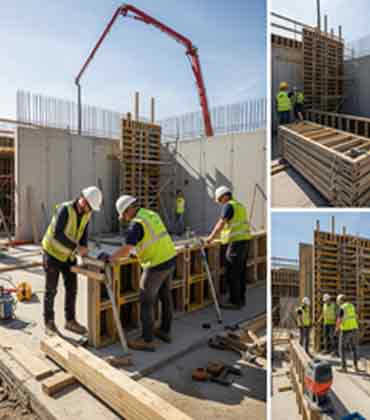Thank you for Subscribing to Construction Business Review Weekly Brief
Construction professionals face intense challenges, including tight deadlines, rising costs, and complex logistics. Success requires adopting advanced technologies, strategic planning, and skilled workforce management. Emphasizing collaboration, innovation, and talent development is key to navigating this demanding environment and ensuring efficiency, quality, and sustainability in modern construction projects. That’s where Madness Forming & Construction Inc. steps in with values rooted in accountability and partnership. Based in British Columbia, this dynamic company has built a reputation for delivering quality concrete formwork—becoming a vital partner to clients that goes beyond the traditional role of a subcontractor. At its core, the company views each project as a shared journey. From pre-construction planning to project completion, the team is hands-on, solutions-driven, and committed to creating tangible value at every phase. Their approach transforms construction into a collaborative process where challenges are anticipated, communicated, and overcome. “We specialize in overcoming issues such as scheduling conflicts, sequencing challenges, and budget management,” says Dimitri Tsonev, director. “Whether it’s handling unforeseen changes, managing project scope, or coordinating with other trades, our team is equipped to navigate these hurdles seamlessly.” This mindset is evident in the company’s track record. It has worked on everything from complex architectural planters to some of the most ambitious high-rises in Western Canada. It has consistently exceeded client expectations in both timelines and execution. One example of Madness Forming’s effectiveness is the Telus Ocean project, a multi-story commercial development in downtown Vancouver. The team delivered it 29 days ahead of schedule—an impressive feat given the project’s unique architectural design and tight deadlines. Their success was largely due to understanding the intricacies of the build and aligning their expertise with its broader goals.
Top Commercial Concrete Formwork Services in Canada 2025
Lane Construction Services did not emerge from a corporate strategy session or a boardroom blueprint. It started with one man, a tool belt, and a drive to build something better in commercial concrete construction. In 2009, Eric Langlois founded the company after years of learning the trade firsthand. He began as an apprentice carpenter in Montreal and, at the age of 22, brought his skills west to Vancouver during the city’s pre-Olympic building boom. The fast-paced environment of that era shaped Langlois’ work ethic and sharpened his eye for detail. He quickly moved from carpenter to general foreman, gaining valuable experience on large-scale projects. When the Olympic rush settled, many would have stayed the course, but Langlois saw a different future. He stepped away from employment to pursue his own vision laying the foundation for what would eventually become Lane Construction Services. “Over the years, we have earned a great reputation, and it is all thanks to the way we consistently treat people with respect and care,” says Langlois. The early years came with their fair share of hurdles. As a young entrepreneur, Langlois took on subcontracts, gradually building a name and reputation. Then came 2015, a turning point. The company picked up speed, and just two years later, it landed its first independent concrete forming contract. That shift marked the beginning of Lane Construction Services transition from a supporting role to a lead contractor overseeing entire sites. Growth followed naturally. Lane Construction Services began handling multiple projects each year, gaining traction through volume and consistent quality. Clients took notice of the company’s blend of speed, reliability, and fair pricing. These were not just selling points, they became core traits that set Lane Construction Services apart in a market often caught between cutting costs and cutting corners. The construction landscape, however, continues to evolve. Developers now grapple with rising taxes and increasingly complex permit processes, both of which delay groundbreakings and strain timelines. Langlois remains grounded in the face of these external pressures, focusing instead on the company’s strengths. Rather than chasing volume at any cost, Lane Construction Services remains committed to delivering top-tier results on time and at a fair price.
Top Project and Construction Management Firm in Canada 2025
Bellerose Project Management is the much-needed breath of fresh air in an industry clouded by red tape and rigid playbooks. A project and construction management firm, Bellerose Project Management provides independent leadership for capital projects, guiding them from early planning to completion. Rather than leaning on cookie-cutter solutions, Bellerose tailors its strategies to fit each project’s unique contours, working with clients to solve problems. Its no-nonsense, hands-on approach has struck a chord across military infrastructure and municipal developments to healthcare facilities. Still, general contractors remain the firm’s backbone, accounting for over half its project volume. As demand grew, so did the company’s reputation. Within just two years of its founding, Bellerose surpassed the one-million-dollar revenue mark—an achievement driven by lean operations, fair pricing, and a reputation for simply showing up and doing the job right. The roots of this success trace back to founder Alex Bellerose’s frustration with traditional project management. He entered the field with the ambition to help shape bold construction projects, only to find a system weighed down by inefficiencies, bureaucracy, and a rigid, one-size-fits-all mindset. Risk documentation was often mistaken for genuine risk management, and firms lacked real construction experience, creating a disconnect between boardroom decisions and on-site execution. Alex set out to build something better and build the company he always wished he worked for. Bellerose Project Management is the result: a merit-based firm grounded in experience, committed to practicality, and focused on delivering real value. Designed to Solve, Not Sell Most clients come to Bellerose with a problem. Sometimes it’s a missing skill, a stalled timeline, a budgeting issue, or a gap in leadership. “You come to us and say what your problem is, and we’ll provide a resource that can fulfill that need,” says Alex Bellerose.
CXO INSIGHTS

Transforming Concrete Pouring with Innovative Formwork Solutions
Tadas Ciuckys, Director of Engineering, Doka USA

In With The Old: New Toronto Through Selective Demolition And Advanced Safety Methods
Matthew Antongiovanni, HSE Manager, Green Infrastructure Partners Inc

Navigating the Evolving Landscape of Construction Management
Emily Pencer, Project Manager, Roxboro Excavation Inc

Navigating the Landscape of Retail Project Management: Strategies for Success
T.J. McKeever, Senior Project Manager, Brixmor Property Group

Building Success Through Collaborative Execution
Jeremy M. Clayton, Director of Project Management, Ruppert Landscape

Crafting Success in Construction
Joel Victoria, Senior Construction Manager, Colliers
IN FOCUS
EDITORIAL
Shaping The Future Of Construction
The construction landscape in Canada is evolving rapidly, driven by the need for faster project delivery, smarter coordination and greater structural integrity. As urban centers grow and infrastructure demands intensify, success depends on a combination of strong project management and advanced concrete formwork systems. These two pillars are reshaping how buildings and public works come to life. Modern construction navigates tighter timelines, rising costs and stricter regulations. Precision, planning and performance now define project success. Project and construction management firms streamline collaboration among architects, engineers, subcontractors and suppliers, ensuring risk control, budget discipline and stakeholder alignment. Concrete formwork has become central to efficiency and innovation. With 3D modeling, BIM integration and on-site automation, formwork is driving smarter, safer builds. Prefabricated components, self-climbing systems and hybrid materials are cutting labor intensity, boosting safety and reducing waste. Whether supporting high-rises or infrastructure megaprojects, advanced formwork solutions handle complex geometries, accelerate timelines and ensure consistent results. This edition of Construction Business Review Canada explores how the synergy between construction management expertise and innovative formwork systems is driving a new standard in modern building. Featured thought leaders include T.J. McKeever, senior project manager at Brixmor Property Group, who explores the growing role of digital twins in improving infrastructure planning and design accuracy before construction begins. Jeremy M. Clayton, director of project management at Ruppert Landscape, advocates for robust planning, strong communication and team integration to efficiently manage complex projects. We hope this edition inspires fresh perspectives on the emerging trends redefining construction across the country.









